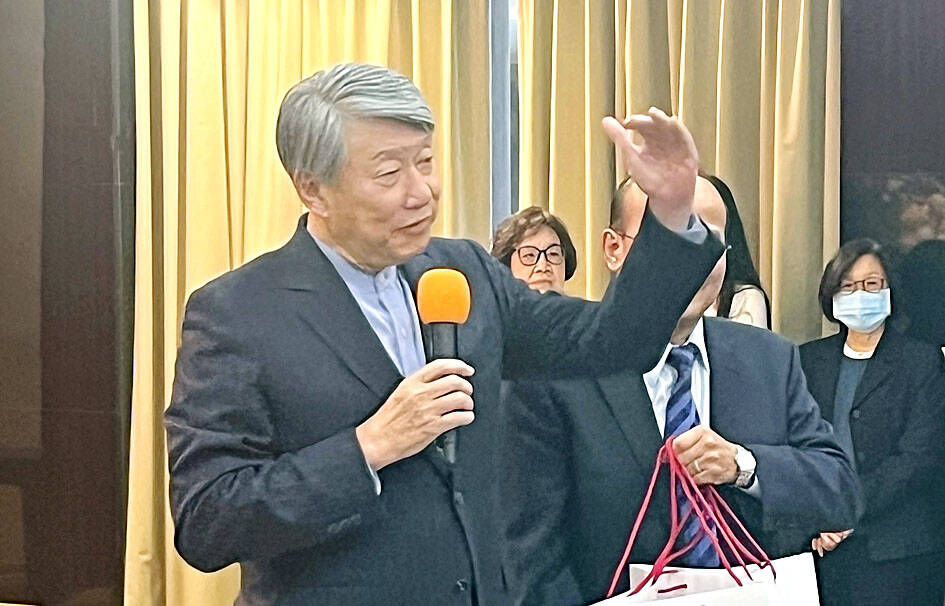Taiwan Semiconductor Manufacturing Co (TSMC, 台積電) needs government permission for any overseas joint ventures (JVs), but there are no restrictions on making the most advanced chips overseas other than for China, Minister of Economic Affairs J.W. Kuo (郭智輝) said yesterday.
US media have said that TSMC, the world’s largest contract chipmaker and a major supplier to companies such as Apple Inc and Nvidia Corp, has been in talks for a stake in Intel Corp.
Neither company has confirmed the talks, but US President Donald Trump has accused Taiwan of taking away the US’ semiconductor business and said he wants the industry back in his country.

Photo: Liao Chia-ning, Taipei Times
Speaking to reporters in Taipei, Kuo said that “no one can shake the foundations” of Taiwan’s semiconductor industry.
“We have to have confidence in TSMC, and the government will fully support the ‘sacred mountain protecting the country,’” he said, using an expression that refers both to the importance of the chip sector and TSMC to Taiwan’s economy.
The government will not interfere in TSMC’s decisions, Kuo said.
“For TSMC to go into the world and have a joint venture in any location, it definitely needs government permission,” he added.
Large overseas investments need to be approved by the Ministry of Economic Affairs, and Taiwan does not allow its companies to produce the most advanced chips in China.
Kuo said there is no change to these rules, but permission must still be first obtained from the government for such production in countries other than China.
TSMC is in the process of investing US$65 billion in new factories in the US state of Arizona, with the government giving permission for what is currently the most advanced 2-nanometer chips to be made there, but not for a couple of years.
Taiwan, which runs a large trade surplus with the US, could also be subject to wide-ranging import tariffs Trump has threatened to impose to deal with trade imbalances.
Kuo said the ministry was collecting information for government negotiators to talk to the Trump administration on the tariffs issue to seek the best conditions for Taiwanese companies, but he declined to comment on the contents of the talks.

Application-specific integrated circuit designer Faraday Technology Corp (智原) yesterday said that although revenue this quarter would decline 30 percent from last quarter, it retained its full-year forecast of revenue growth of 100 percent. The company attributed the quarterly drop to a slowdown in customers’ production of chips using Faraday’s advanced packaging technology. The company is still confident about its revenue growth this year, given its strong “design-win” — or the projects it won to help customers design their chips, Faraday president Steve Wang (王國雍) told an online earnings conference. “The design-win this year is better than we expected. We believe we will win

Intel Corp chief executive officer Lip-Bu Tan (陳立武) is expected to meet with Taiwanese suppliers next month in conjunction with the opening of the Computex Taipei trade show, supply chain sources said on Monday. The visit, the first for Tan to Taiwan since assuming his new post last month, would be aimed at enhancing Intel’s ties with suppliers in Taiwan as he attempts to help turn around the struggling US chipmaker, the sources said. Tan is to hold a banquet to celebrate Intel’s 40-year presence in Taiwan before Computex opens on May 20 and invite dozens of Taiwanese suppliers to exchange views

Chizuko Kimura has become the first female sushi chef in the world to win a Michelin star, fulfilling a promise she made to her dying husband to continue his legacy. The 54-year-old Japanese chef regained the Michelin star her late husband, Shunei Kimura, won three years ago for their Sushi Shunei restaurant in Paris. For Shunei Kimura, the star was a dream come true. However, the joy was short-lived. He died from cancer just three months later in June 2022. He was 65. The following year, the restaurant in the heart of Montmartre lost its star rating. Chizuko Kimura insisted that the new star is still down

While China’s leaders use their economic and political might to fight US President Donald Trump’s trade war “to the end,” its army of social media soldiers are embarking on a more humorous campaign online. Trump’s tariff blitz has seen Washington and Beijing impose eye-watering duties on imports from the other, fanning a standoff between the economic superpowers that has sparked global recession fears and sent markets into a tailspin. Trump says his policy is a response to years of being “ripped off” by other countries and aims to bring manufacturing to the US, forcing companies to employ US workers. However, China’s online warriors